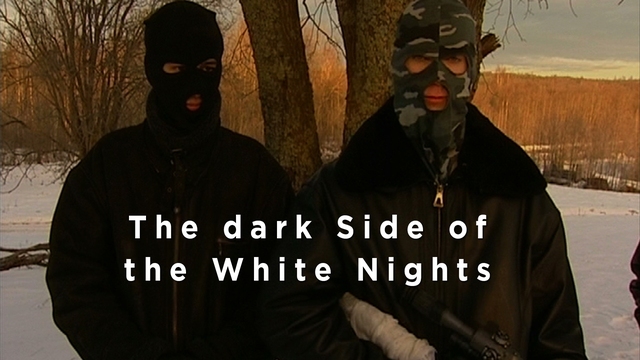The Dark Side Of The White Nights
The ultra right is taking over in Russia. White supremacists, determined to preserve the purity of the Slavic race, are turning St Petersburg into the Neo Nazi capital of the world. We follow this worrying trend.
 White supremacists, determined to preserve the purity of the Slavic race, are turning St Petersburg into the Neo Nazis capital of the world. In the past two years, there have been over a thousand racially motivated attacks. Not even young children are safe. Our documentary this week focuses on the murder of one African student, whose death came to symbolise all racial killings in St Petersburg. It reveals how a post-Perestroika Russia, still searching for identity, is falling under the sway of the ultra-right.
White supremacists, determined to preserve the purity of the Slavic race, are turning St Petersburg into the Neo Nazis capital of the world. In the past two years, there have been over a thousand racially motivated attacks. Not even young children are safe. Our documentary this week focuses on the murder of one African student, whose death came to symbolise all racial killings in St Petersburg. It reveals how a post-Perestroika Russia, still searching for identity, is falling under the sway of the ultra-right.
It started out just like any other night for foreign students Michel and Samba. But as they left their university party, someone was waiting for them. "I saw a man with a gun. We all started running, then realised someone was missing", recalls Michel. "We looked back and saw a body lying flat. Samba".
Samba's death was just the latest in a long series of attacks targeting foreigners in Russia. In one of the most notorious cases, a nine year old Tajik girl was beaten to death by skinheads. Her killers only received a short sentence. "We knew there was a growing problem of racism in Russia but we didn't know how serious it was", laments Samna's father. "We only became fully aware when we got the news our son was murdered".
Reluctant to acknowledge the scale of the problem, police normally attribute racist murders to hooliganism. But in Samba's case, that was impossible. The killers left behind a gun with a swastika and 'WP', the initials of 'White Power', carved on the handle. "The swastika on the gun means the people who killed him were members of the neo-Nazi organisations", explains Prof Dubrovsky. "It was specially made by those people simply to inform the world of the exact motives of this crime."
It's estimated there are around 15,000 skinheads in St Petersburg. "Usually the groups are quite small", states Prof Dubrovsky. "Socially, they are from low-middle class families and their parents have lost work and social status during the Perestroika". As Yelizabeta Ivanova explains; "They believe Russians are better than anybody else and that Russians are oppressed by everyone else".
Encouraged by political parties like the DPNI, which claim Slavic Russians "are on the verge of extinction", Neo-Nazi members believe they're fighting for the very survival of their race. "We regularly train in shooting so that our fighters can protect our country from invasion at any time". "They consider us as invaders and say that, if we settle here and give birth to many children their race will disappear," states one foreign student.
It's not only foreigners who are targeted by Neo-Nazis. University professor Nikolai Girenko regularly testified in trials of Neo-Nazis. "He testified knowing perfectly well that those people against whom he was speaking were dangerous", states Anna Sharogradskaya. He was murdered by a shadowy organisation which; "sentenced him to death as an enemy of the Russian Nation".
The situation has now got so bad that foreign students claim they only feel safe in their dormitories. "Samba once told me that we carry our coffins when we go out", recalls Michel. "You are never certain to come back alive".
FULL SYNOPSIS
